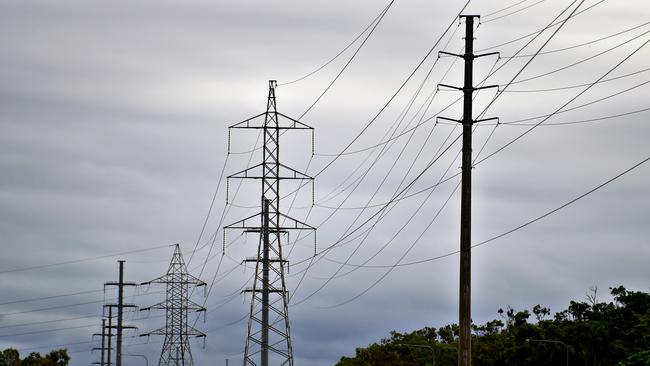‘Dire situation’: Energy experts warn more retailers could fold amid ‘soaring’ prices
Energy experts are warning smaller energy suppliers could fold amid “soaring wholesale electricity costs” as one retailer tells its customers to switch companies now.
QLD Business
Don't miss out on the headlines from QLD Business. Followed categories will be added to My News.
Energy experts are warning more Tier 2 retailers could fold amid market “volatility” and “soaring wholesale electricity costs”.
According to the latest AER data, there were 412,284 customers with Tier 2 retailers between October and December 2021, which is 19.2 per cent of the total market share in Queensland.
But this continued “volatility” in the wholesale energy market has resulted in added cost pressures on both retailers and consumers.
Compare the Market’s general manager energy and utilities Brett Mifsud said wholesale prices are increasing due to “several factors”.
“Unfortunately, there are several factors at play that have contributed to a perfect storm,” he said.
“Notably, the rising cost of coal, which generates three-quarters of Australia’s electricity, has skyrocketed in the past two years.
“We’ve been hit with several severe weather events in recent times and the war in Ukraine is also impacting these wholesale prices,” he said.
“Energy retailers, which sell Australians electricity plans, purchase electricity at a wholesale price to sell to customers - to recoup costs and still make a profit, retailers are increasing the price of the electricity they sell to customers.”
Shadow Minister for Natural Resources, Mines and Energy Pat Weir said Queensland has the highest electricity prices in the country.
“There is growing evidence that the Queensland Government’s energy generators are rorting the National Energy Market, pushing up power prices for Queenslanders and businesses,” he said.
“The State Government is milking excessive profits from our generators and trickling only a handful of money back to consumers.
“The Palaszczuk Government must act before businesses go broke and the rising cost of living pressures hit Queenslanders even harder.”
Mr Mifsud said the “bigger players” have longer term contracts with generators and can bulk purchase for greater volume.
“They can project how much it will cost to buy electricity that they sell to their existing customer base and new customers,” he said.
“The smaller players aren’t able to contract the same volumes with their significantly smaller customer base, so their prices are higher or they’re purchasing in the spot market at whatever the current market price is for electricity. They have to pass these costs onto their customers.”

Luke Blincoe, CEO of smaller player ReAmped Energy, made headlines this week when he told customers it was in their best interests to switch to another retailer as soon as possible to get a cheaper price.
Speaking to The Courier-Mail Mr Blincoe said the move was a sign of the “dire situation” for competition in the market.
“It guts us to say to customers ‘the best thing for you to do is leave’, but they’ve got to shop around while there are still a few good deals around,” he said.
He said households that don’t leave are likely to be hit with a percentage bill increase in the “triple figures” — so at least a doubling in total charges.
The Australian Energy Regulator (AER) said they are closely monitoring the situation in both the wholesale and retail markets and ensuring all participants are complying with the law and the rules.
Mr Mifsud said ReAmped was not alone in the current predicament.
“ReAmped needs to purchase electricity at those current inflated prices and pass on the costs to customers. Other small retailers will be in the same situation,” he said.
Retailers who both generate power and sell it to households include AGL, Origin and Energy Australia, which between them already control the remaining 80.8 per cent of the retail market.
Safeguards are in place to protect consumers including a price cap on standard default contracts, known as the default market offer, to protect consumers from unjustifiably high prices, as well as the Retailer of Last Resort scheme, designed to ensure that in the event of retailer failure, arrangements are in place to ensure that customers continue to receive electricity or gas supply.
Under this scheme, the AER has the power to transfer customers to a new retailer.
In this current environment, it is especially important that customers engage with their retailers to ensure they are on the best energy plan for their individual circumstances, according to AER.
Residential customers can currently save around $443 or 24 per cent off their bill, and small businesses can save around $1308 or 29 per cent by switching.

Mr Mifsud said several scenarios could play out, but “it’s important to note that these won’t impact Tier 1 retailers, which are Origin Energy, AGL and Energy Australia.”
“If customers stay (with Tier 2 retailers), there’s a higher probability that they won’t be able to pay the retailer – especially if prices are increasing by 100 per cent,” he said.
“This could also cause the retailer to crash due to reduced cashflow and increased debt collection activities,” he said.
“There’s also a possibility that some retailers don’t want to lose their customers and aren’t passing as much of the price onto them.”
But Mr Mifsud said there are “safeguards in place” to keep Australian households connected.
“If a retailer folds their business, customers can switch to another retailer without any disruption to their power. If they choose not to switch, the regulators have in their power to automatically switch customers to the Retailer of Last Resort so that they will always have a retailer that can support them,” he said.
“The exact Tier 1 retailer you’re moving to would depend on your distribution area. In the case of electricity, those in the Energex, Citipower, Powercor, Essential and Endeavour distribution areas would move to Origin.
“Ausgrid and Ausnet customers would move to Energy Australia, while SA Power, United Energy and Jemena customers would move to AGL.”




